|
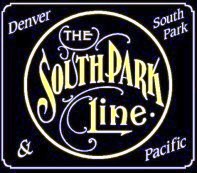  DENVER, SOUTH PARK and PACIFIC RAILROAD DENVER, SOUTH PARK and PACIFIC RAILROAD
DSP&P
Combination Coach-Baggage
Cars #1, 4, 6, 8, 23, 25, 26
The seven DSP&P
combination coach-baggage cars were built between 1874 and 1879 by
four different builders. They had baggage doors on each side toward one end
and a passenger compartment taking up about 2/3 of the car-body.
Each of the 7 cars was unique in size and appearance, particularly
the window shape, size, and number. Original roof lines were the duckbill style but were
converted at various times to the bullnose variety. Baggage-end
platforms were removed and that end door sheathed over before or
during early C&S days.
Source:
MidContinent Museum DSP&P Passenger Car
Pages
|
DSP&P |
U.P.
1885 |
DL&G
1889 |
C&S
1899 |
C&S
1906 |
|
#1 Auraria |
#700 |
#700 |
#122 |
#22 |
|
#4 Halls
Valley |
Coach
#64 |
#64 |
#158 |
#77 |
|
#6 |
#701 |
#701 |
#123 |
#23 |
|
#8 |
#702 |
#702 |
#124 |
#27 |
|
#23 |
#703 |
#703 |
#125 |
#25 |
|
#25 |
#704 |
#704 |
#126 |
#24 |
|
#26 |
#705 |
#705 |
#127 |
#26 |
|
DSP&P. |
#1 |
#6, 8 |
#23,25 |
#26 |
|
Build
Date |
1874 |
1879 |
1874**
|
1879 |
|
Built by |
Hallack |
DSP&P |
Bowers Dure
|
Ohio Falls |
|
Length
Over End Sills |
34'-9" |
35'-0" |
35'-0" |
40'-0" |
|
Length
Over Buffers |
39'-8" |
39'-4" |
40'-0" |
45'-1" |
|
Truck
Centers |
24'-3" |
23'-10" |
25'-3" |
30'-0" |
|
Truck
Wheelbase |
5'-0" |
5'-0" |
5'-0" |
5'-0" |
|
Width |
7'-7" |
8'-0" |
8'-0" |
8'-0" |
|
Height of
Body |
8'-11" |
9'-1" |
9'-0" |
9'-1" |
|
Body
Above Rails |
37" |
37" |
34" |
36" |
|
Clear
Opening of Doors |
3' 11½" x 5' 4¾"
|
N/A |
3' 11½" x 5' 4¾"
|
3' 8½" x
5' 5"
|
|
Wheel
Size |
24" |
24" |
24" |
24" |
|
Weight |
26,600 |
37,040 |
32,000 |
34,000 |
|
Roof |
Hooded (1874)
Bullnose (1898) |
Broken Duckbill (Through 1890s)
Bullnose |
Hooded (1874)
Bullnose (1898) |
Duckbill (1880s)
Bullnose
|
|
Heating |
Stove |
Stoves |
Stoves |
Stoves |
|
Lighting |
Oil Lamps |
Oil Lamps |
Oil
Lamps |
Oil
Lamps |
|
Interior
Finish |
Ash Oak |
Ash Oak |
Ash Oak |
Ash Poplar |
|
Termination Date |
1925? |
1923 |
1910 |
1942 |
 HISTORY HISTORY
DSP&P combine #1,
named "Auraria", was assembled by the Hallack Lumber Company in
Denver in 1874, along with coach #2, named "Denver". These were the
railway's complete passenger complement until 1878. This car
might have been built to a coach plan with windows 3 and 4 (of 13)
replaced by a narrow baggage door. There were 6 windows to a side in
the passenger compartment, but the end ones were not placed opposite
each other, to accommodate stove and toilet. The car's name plaque was
centered on the car. Seating was probably 2+1 in 5 rows with water
closet and a stove in the 6th row.
Length over end sills for all cars in the table are for the single
platform version. 
DSP&P
#4, "Halls Valley", was reported to be delivered as a combination
car, but during the renumbering in 1885 it received a number in the
"coach" category (#64 instead of a 700 series number). It was built
by Barney and Snith in 1878. Seating and window arrangement as a
combine are not known as there are no known photos of the car as a
combine.
DSP&P
#6 and #8, unnamed, were assembled by DSP&P Denver Shops in 1879.
DSP&P #6 had the
same layout as DSP&P #1, but was about 5 inches wider. Seating was 2+2 in 6
rows, with toilet and stove at the end of the car. DSP&P #8
was originally a Chair Car, with a row of reclining swivel chairs on
both sides of the passenger compartment. By 1885, these chairs had
been removed and replaced with conventional seats. The C&S folios
show 7 windows in car #6 and 8 in car #8, and the dimensions of #8
show a longer car than #6.
DSP&P #23 and #25 were built by Bowers, Dure for the AT&SF
in 1874. When AT&SF lost the "narrow gauge wars", the cars and two
coaches became surplus and were sold to DSP&P in 1880. DSP&P #23 had
7 windows with 6 rows of 2+2 seating. DSP&P #25 had the same
seating but a larger area at the toilet and stove area, and an extra
window, according to the C&S folios.
DSP&P #26 was built by Ohio Falls in 1879 and arrived on the South
Park in 1880. It had 8 windows and 7 rows of 2+2 seating. The photo
history of this car is somewhat ambiguous so the early DSP&P history
is murky at best.
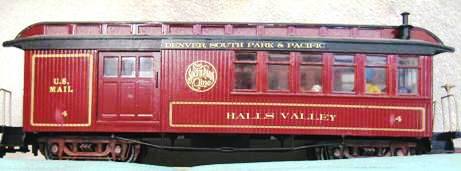
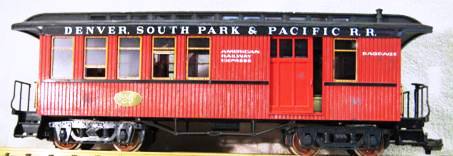
DSP&P #4 "Halls Valley and #25 as they appear on the author's roster; #4
is a Bachmann model with custom
paint and
lettering, #25 is from LGB with some modifications, both are short a
few windows.
 PHOTO GALLERY PHOTO GALLERY
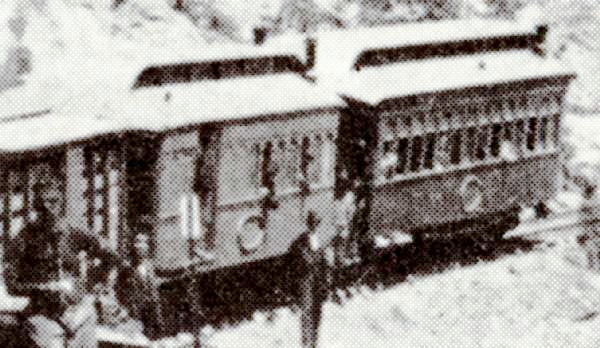
South Park coach-baggage car #1 at Buffalo Creek Station, probably
during the latter half of 1878, with one of the brand-new Barney &
Smith coaches. This and another early photo show DSP&P #1 as a
lighter colour than other cars - maybe clear varnish on pine instead
of chocolate brown paint.
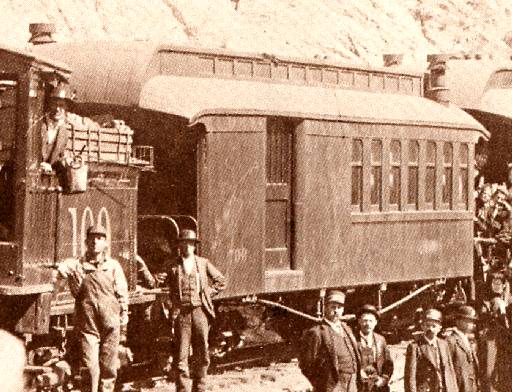
Denver, Leadville & Gunnison #700 (ex DSP&P #1) at Roscoe on the Colorado Central,
1898.
 FOLIOS and PLANS FOLIOS and PLANS
Maxwell's plans for combination coach-baggage cars #1 and #6 resemble
the folio drawings show later on this webpage, but include the
missing end platform and some additional; comments.
DSP&P Combine #1 "Auraria"
and DSP&P #6, later #700 and 701
C&S #122 (later #22) and C&S #123 (later #23)
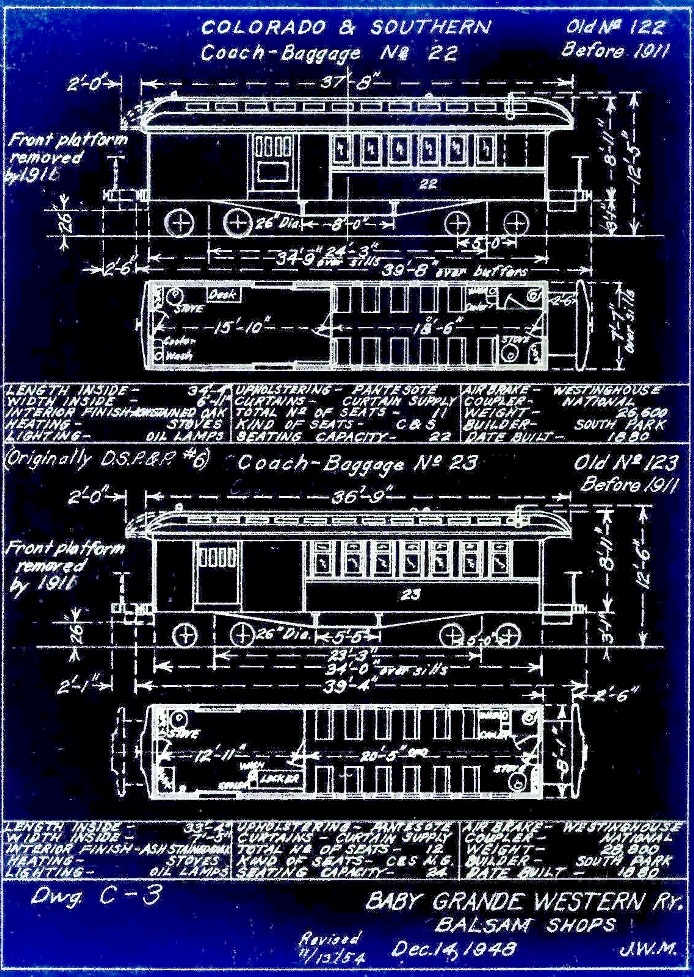
These folios of
the DSP&P combination cars show their configuration after 1906. You
will need to add the end platform to
visualize their appearance in the DSP&P era of the 1880's. Overall
length over the body will be helpful for modelers.
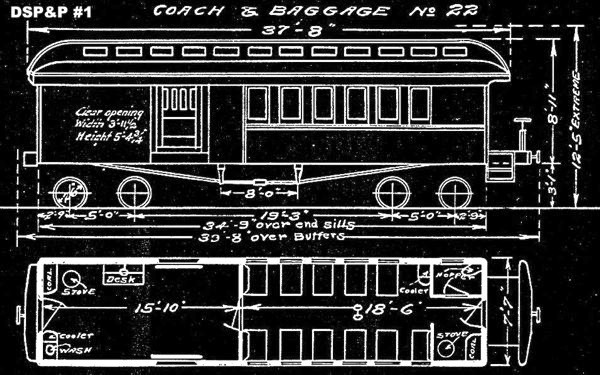
NOTE: The folio drawing below is
for the coach version of DSP&P #4, after conversion from a combine,
sometime before mid-1885.
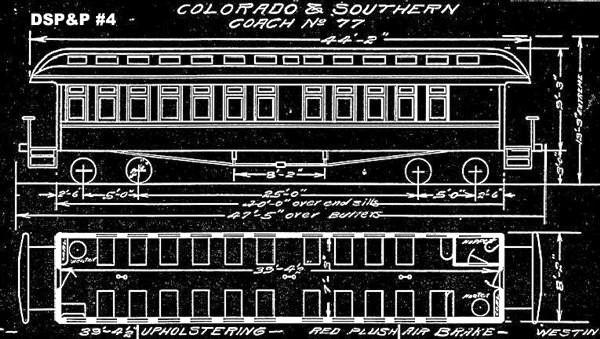
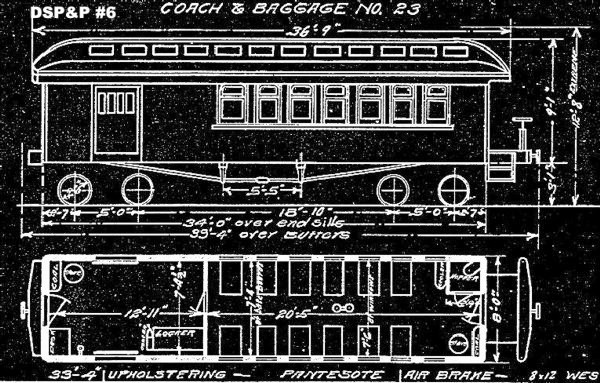
NOTE: The folio drawing below is
for the combine version of DSP&P #7, after conversion from a coach,
date of conversion not known.
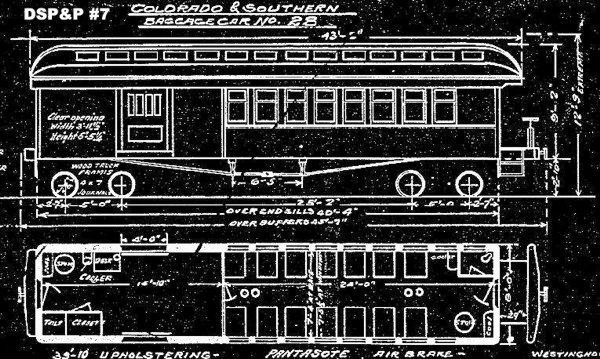
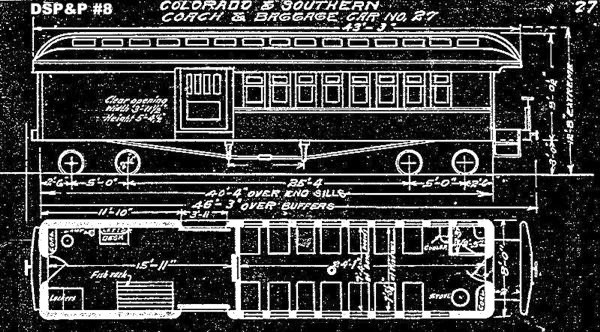
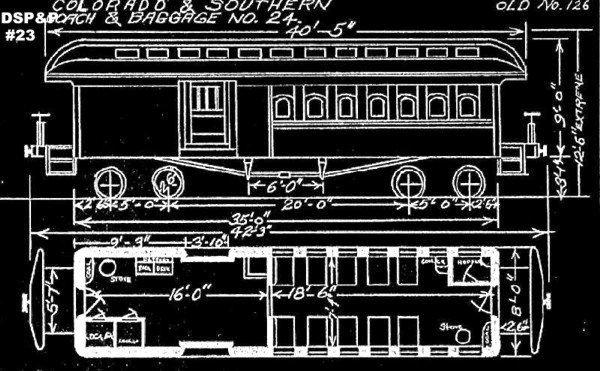
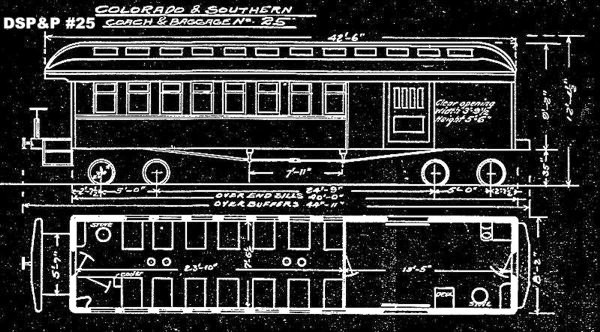
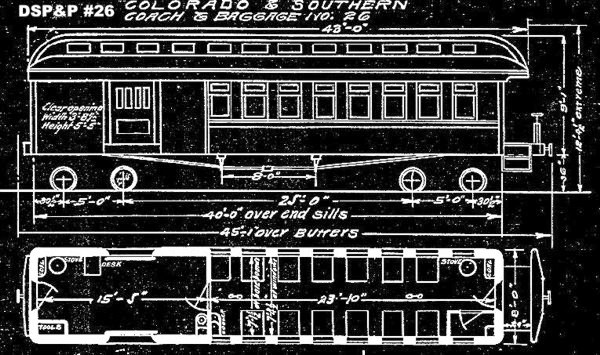
|












